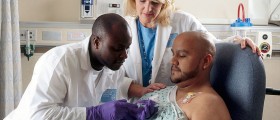
Esophageal cancer is the type of cancer where the cancer cells develop in the esophagus. This organ is a long and hollow tube that connects the throat to the stomach. The main function of the esophagus is to get the food and liquids from the throat to the stomach. The line inside of the esophagus is the place where the cancer cells start developing. Cancer cells can show up anywhere along the esophagus in the United States they are most often seen in the lower part of the organ, close to the stomach. This type of cancer is not considered to be common in the United States. However, the situation is different in Asia and certain parts of Africa.
Esophageal cancer complications
The actual cause of cancer of the esophagus still remains unknown. However, the experts are aware of various different risks that increase the chance of development of cancer. Excessive use of tobacco and alcohol are two of the most dangerous risk factors for cancer of the esophagus. A diet rich in high fat foods is another risk factor. Fried foods, chips and pork and beef need to be brought to the minimum in order for the chances of developing this type of cancer to decrease. GERD or heartburn and Barrett syndrome are also risk factors and it is vital to control these syndromes.
Signs and symptoms of esophageal cancer are not seen in every patient and this is one of the main reasons why it is such a problem making a diagnosis for this disease. Problems with swallowing are the most often seen sign of esophageal cancer. Apart from that sign, certain other signs may appear like pain in the chest and stomach, loose bowel movements, bloody stools, hard bowel movements, loss of appetite, nausea and weight loss.
If the cancer is not diagnosed in the early stages, it will progress and then it may lead to certain complications. Obstruction of the esophagus can occur as one of the complications. When that happens, the passing of the food through the esophagus will become almost impossible. Severe pain may occur as well. Advanced cancer can lead to bleeding in the esophagus. In most situations the bleeding is gradual but it can appear all of a sudden sometimes. Unnatural weight loss is another serious complication that may occur. Esophageal cancer can create a hole in the windpipe. That hole is called tracheoesohageal fistula and it will lead to strong and sudden coughing every time a person swallows.
Care plan for esophageal cancer
Weight loss, lack of appetite, problems with swallowing and weakness and lack of energy are almost always present in patients diagnosed with cancer of the esophagus. The doctors will often recommend a liquid diet, tube feeding or intravenous feeding due to these problems for as long as the patient is being treated. The doctor will usually consult a registered dietitian in order to come up with the best possible solution for the problem that occurred. The patient can do certain things on his or her own while he or she waits for the advice from a doctor. Eating foods that are easy to swallow is essential. Soups, yogurts and milkshakes are the best options. Big meals need to be avoided and smaller meals more times per day are a lot choice. Consuming enough minerals and vitamins is of great importance and the patient should consult either his or her doctor or a dietitian about any questions he or she may have.
Side effects of both cancer and cancer treatment are plenty and that is why a lot of patients are interested in complementary and alternative therapies. These therapies should provide relief for these side effects. Some of the most often sought therapies are acupuncture, guided imagery, hypnosis, massage and relaxation techniques. However, before choosing any of the therapies, the patient needs to consult the doctor and make sure that they will not cause further harm to him or her.
Coping with fear, shock and sadness and support are essential parts of the esophageal cancer care plan. Fear, shock and sadness are seen in almost all patients and it may take quite a while for some to recover from them. Every patient will need time to cope with the fact that he or she is suffering from cancer of the esophagus. Coming to terms with the fact takes time as well. A lot of experts advise patients to learn as much as they possibly can about the type of cancer until they have found the thing that provides comfort for them. The doctor should be able to tell the patients about the type and stage of cancer but also about the recommended sources of information.
Patients should not lose touch with family and friends as their support is essential, especially during the treatment. A majority of people will offer help when they find out that a person close to them is diagnosed with any type of cancer. Finding a person to talk to is one of the most vital steps in the process of recovery.

















Your thoughts on this
Loading...